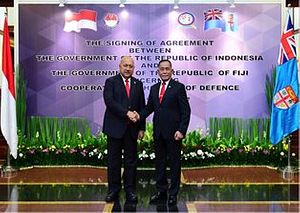On August 13, the defense ministers of Indonesia and Fiji briefly held an official meeting in Jakarta. While few specifics were publicly disclosed about what was discussed, the interaction nonetheless put the spotlight on the still young but growing defense relationship between the two countries in spite of the challenges that remain.
Indonesia and Fiji have long had a diplomatic relationship, which dates back to 1974. But the defense component of ties more specifically has only seen an uptick in recent years, in spite of some of the continued complications it creates for Fiji’s positions on issues such as West Papua both at home and abroad with some regional states. Notable steps have included Jakarta’s assistance in capacity-building and reconstruction as well as some collaboration among their police forces, with officials from the two countries also talking up some more ambitious areas for cooperation as well that have yet to be realized.
Within that broader context, a notable development came in September 2017, when there was finally the inking of a memorandum of understanding on defense cooperation in September 2017 between Fiji’s Defense Minister Ratu Inoke Kubuabola and Indonesian Defense Minister Ryamizard Ryacudu. The agreement, which had been talked about for months previously, covered a range of areas – including exchanges, visits, dialogues, research, information-sharing, and capacity-building – across common issue areas to include counterterrorism and peacekeeping. Both sides had indicated that it would lead to the deepening of security cooperation in a wider range of areas.
Last week, in another indicator of the ongoing defense ties between the two countries, Ryacudu received Kabuobola at the offices of the Indonesian defense ministry (KEMHAN) on August 13. While the meeting was quite brief, according to the ministry, one of the items under discussion was the advancement on exchanges of naval officers between both sides.
The discussion of the item itself was no surprise: it had been floated as one of the areas for further cooperation previously as well. Few details were disclosed about exactly how this would play out, though the initial focus as laid out was on education and only for a few officers over a few days. That was testament to both the nascent nature of defense ties between the two sides as well as the need for calibration between their bilateral ties as well as other bilateral relationships in the region as well.
Nonetheless, with the MOU signed and given the willingness of both sides to gradually expand the scope of their defense ties, how things actually evolve in the coming months will continue to be of interest to not only the two countries, but other actors in the region and beyond.
































